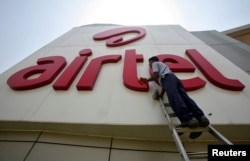An initiative by Facebook to bring free Internet access to the poor in India has run into a storm of criticism by those who say it will violate net neutrality -- the principle that Internet providers allow equal access to all online content.
In recent days, Facebook has been defending its plans in appeals directly to the public, through advertisements in leading newspapers and on huge billboards in major cities. The advertisements defend its app, called Free Basics, which gives free access on mobile phones to a handful of sites for services such as communication, healthcare, and education. The ads say the platform aims to bring a million Indians in poor rural areas online.
The aggressive outreach came as India’s regulatory authority, Telecom Regulatory Authority of India (TRAI), suspended the rollout of Free Basics service earlier this month.
On Monday, in an article in the Times of India, Facebook founder Mark Zuckerberg made a personal appeal to garner support for Free Basics, calling it a “bridge to the full Internet and digital equality” and wondered who could oppose such an program.
Philanthropy or marketing?
Staunch defenders of net neutrality say the plan is less about philanthropy and more about improving Facebook’s position in the fast-growing Indian Internet market.
An Indian group called savetheinternet.in is at the forefront of opposition to the plan to give free access to only a select group of Internet sites.
Nikhil Pahwa, a volunteer at the group, questioned why Free Basics gives users access to only about a 100 sites, instead of giving them access to the entire web?
“I think the idea is to give them access to everything and let them choose what works for them. Free Basics is trying to perpetuate this false dichotomy that you cannot give free Internet access without limiting it,” Pahwa said.
He said there already exist alternatives, such as a plan from Indian carrier Aircel that is rolling out access to the open web at relatively slow speeds of 64 kbps. He said that at least gives people a choice for where they will spend their time, instead of creating a separate “walled garden” as Facebook proposes.
In his article in the Times of India, Mark Zuckerberg said the company has already rolled out the service in 30 emerging markets. He questioned his critics, saying that "instead of welcoming Free Basics as an open platform that will partner with any telco [telecommunications company], and allow any developer to offer services for free, they claim – falsely – that this will give people less choice.”
But the Facebook boss has been unable to convince campaigners fighting for open access to the web. They say under the guise of providing free Internet, Facebook is pushing a corporate strategy to cement its position in one of the world’s fastest growing online markets, which already has 130 million Facebook users. As many as 700 million more people could come online in the coming years.
Free internet?
“This is just a smart customer acquisition or a user acquisition strategy from Facebook,” Pahwa said. “Facebook has said they reserve the right to monetize it (Free Basics) later. They get users to sign up and then they change the rules.”
A similar controversy that erupted in April this year forced an Indian telecom, Bharti Airtel, to suspend plans to launch a new marketing platform, Airtel Zero, where Internet businesses could pay to have users browse their sites for free.
Facebook says more than three million people have petitioned the Indian regulator, TRAI, in support of Free Basics. Indian campaigners say many people signed on inadvertently, not knowing what they were supporting.
In any case, opponents say they are not disheartened by those numbers, saying they do not have funds to splash on huge advertising campaigns, but do have committed public opinion on their side.
“The regulator does not run a popularity contest. A public consultation is not about who has more members, it is about who has more sensible opinions… we are hoping the regulator will do their job properly,” said Kiran Jonnalagadda, a volunteer at savetheinternet.in in Bangalore.





